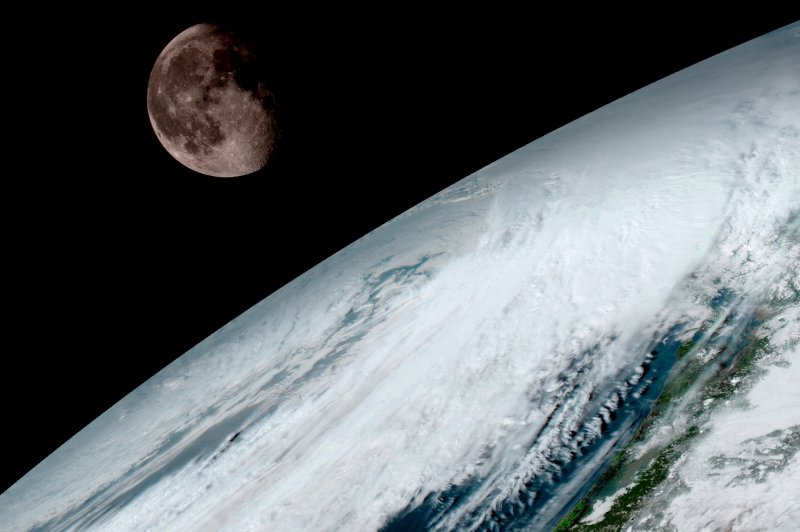While the United States has set up national regulations and bilateral commercial space agreements, some experts suggest an international agreement -- akin to the Montreal Protocol that limited CFC usage -- could better guide the eventual commercialization of space and the moon. Photo by NOAA |
License Photo
Oct. 8 (UPI) -- In a newly published policy paper, a pair of Canadian scientists warn that the United States is angling to establish itself as the de facto gatekeeper of the moon and other celestial bodies.
Earlier this year, NASA published a new set of rules for lunar mining and other space activities, dubbing the voluntary guidelines the "Artemis Accords."
Aaron Boley and Michael Byers, authors of the new Science paper, argue that the Artemis Accords are part of a concerted effort by the U.S. and NASA to set a legal precedent for space-based resource extraction.
"It's not the Artemis Accords alone that are problematic," Michael Byers, professor of global politics and international law at the University of British Columbia, told UPI in an email. "Rather, it's the ongoing and concerted U.S. diplomatic effort to promote national regulation of space mining and to proceed with resource extraction before a multilateral agreement has been negotiated."
In 2015, Congress passed the Commercial Space Launch Competitiveness Act, which allowed U.S. citizens and companies to "engage in the commercial exploration and exploitation of space resources."
Last month, NASA said it plans to buy lunar soil from a commercial company.
"We are buying the regolith, but we're doing it really to demonstrate that it can be done, that the resources extracted from the moon are in fact owned by the people who invest their sweat, and their treasure, and their equity into that effort," NASA Administrator Jim Bridenstine said during a virtual presentation in September.
Byers and his co-author Boley, professor of astronomy and physics at the University of British Columbia, see the succession of legislative and policy moves by the United States as an attempt to establish national regulation of space mining.
"The current U.S. approach to space mining emphasizes national regulation and rejects space as being a 'global commons,'" Byers told UPI. "The result could be inconsistent national laws, a regulatory 'race to the bottom' and even 'flags of convenience' as nations compete to attract space mining companies."
Without international standards and an independent system of monitoring, Byers and Boley argue, bad behavior by one nation begets bad behavior by another. The paper's authors suggest bilateral agreements like the Artemis Accords could imperil efforts to forge future international space agreements.
"A better alternative would be to negotiate a multilateral agreement, and to do so now, rather than seeking to set precedents through unilateral and bilateral actions," Byers said.
Byers and Boley would like to see a multilateral approach to space resource management. The authors point to the Montreal Protocol on Substances that Deplete the Ozone Layer as a model for international cooperation.
"The key is to have solid science, open information sharing, alternative technologies, and cooperation among actors," Byers said. "An international framework will set the standards and provide the required transparency. It will also give a voice to nations that cannot operate in space now, but will in the future. Scientists, engineers, and industry can do the rest."
While the Montreal Protocol has enjoyed considerable success in shrinking the hole in the ozone layer, the fight to curb the release of ozone-depleting chemicals isn't a precise corollary for regulating space mining.
"Many in the U.S. space industry would disagree with the idea that we need an international, multi-lateral treaty to move forward with space mining," Alex Gilbert, research fellow at the Payne Institute at the Colorado School of Mines, told UPI in an email. "There is no evidence that a multilateral or global treaty would be more effective than the approach the United States is taking."
Rather than the Montreal Protocol, Gilbert points to the UN Convention on the Law of the Sea -- not as an ideal model but as an example of a multinational agreement gone wrong. The United States declined to sign the law because it requires participation in an international profit sharing mechanism.
"The administration of UNCLOS deep sea mining regime leaves much to be desired -- commercial extraction has yet to take place, the profit sharing mechanism is not clearly established, and it is unclear whether there will be sufficient levels of environmental protection," Gilbert said. "Most deep seabed mining leases have gone to China and without effective governance it is not clear that that system is more effective than alternatives."
To date, attempts to establish a multinational space mining regulatory regime have faltered, and Gilbert suggests bilateral agreements like the Artemis Accords can serve as a stepping stone to a multinational space governance regime.
"The U.S. is uniquely suited to be a leader on space mining policy and space policy more broadly," Gilbert said. "It is currently engaged with space partners around the globe and its efforts are making it a global leader in space policy. International accords are difficult to negotiate but the U.S. approach is well suited to developing an iterative, collaborative and international process."















